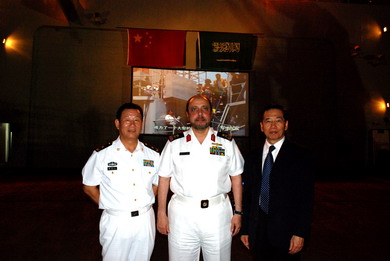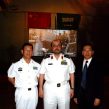
China Expands Naval Presence through Jeddah Port Call
Publication: China Brief Volume: 10 Issue: 25
By:

China’s naval presence on the global stage is expanding. While counter-piracy and escort operations in the Gulf of Aden and Arabian Sea have significantly contributed to the Chinese navy’s growing profile, foreign port visits by its naval vessels to the Gulf region are emerging as an important element in Chinese naval strategy. China’s overseas naval presence is an important measure of its great power status, and port visits are an effective means of projecting naval power. The Chinese Navy’s growing naval activism was recently highlighted by an unprecedented visit by the People’s Liberation Army Navy (PLAN) at Jeddah Port in Saudi Arabia. On November 27, China’s sixth naval escort flotilla arrived at the port of Jeddah. The port call was officially billed as a five-day "goodwill" visit and marks the first ever call to Saudi Arabia by Chinese naval vessels (Xinhua News Agency, November 28; Fmprc.gov.cn, November 29). In light of the apparent expansion of the diplomatic mission of the PLAN, a careful study of Chinese port visit activities may provide useful insights into Chinese foreign policy objectives.
The sixth naval escort flotilla just completed a five-month long escort mission in the Gulf of Aden off the coast of Somalia. According to the official Xinhua News Agency, the flotilla, which is under the command of the chief of staff of the PLAN South Sea Fleet, Rear Admiral Wei Xueyi, included the Chinese Navy’s largest surface combatant, the amphibious dock landing ship Kunlunshan, missile destroyer Lanzhou, and supply ship Weishanhu (Xinhua News Agency, November 28). A reception that was reportedly organized on the deck of Kunlunshan was attended by Rear Admiral Abdullah Al-Sultan, the commander of the Saudi Navy’s Western Fleet and other officers. Chinese Ambassador Yang Honglin, Consul General Wang Yong, Military Officer Zhang Zhuoyong, and hundreds of people from the business community were also in attendance (China Review News, November 28; Fmprc.gov.cn, November 29).
The Chinese Ambassador to Saudi Arabia, Yang, hailed the sixth naval flotilla’s port call as an important milestone in the two countries’ military exchanges that will benefit the deepening of their "strategic friendly relations" (China Review News, November 28). Rear Admiral Abdullah Al-Sultan expressed hope that the visit will help advance the two countries’ military exchanges and cooperation, and contribute to the comprehensive development of bilateral relations (China Review News, November 28). Indeed, the port visit will likely enhance cooperation between the Chinese and Saudi navies, promote mutual understanding, and further strengthen lines of communication between the two militaries.
The notable uptick in port calls made by the PLAN seems to reflect the Chinese renewed appreciation of the value of naval presence for its foreign policy implementation. For instance, the missile destroyer Guangzhou was sent through the Suez Canal into the Mediterranean to conduct port calls in Egypt, Greece, Italy, and then later visited Burma (Myanmar) and Singapore earlier this year (PLA Daily, July 26). The Chinese Navy’s increasing role as an instrument of state policy follows in line with President Hu Jintao’s ‘New Historic Missions,’ which underscores the PLA’s role in safeguarding Chinese interests overseas. Through extended port calls, the PLAN is demonstrating its capacity and capability to promote the nation’s global interests.
While the exact purpose of the Jeddah port visit is uncertain, the motives behind the visit appear both strategic and political-diplomatic. The rapid modernization of China’s naval forces coupled by its growing naval diplomacy illustrate the rise of China as a naval power with global ambitions. The first ever port call also occurred in the context of China’s broader engagement with the Middle East region, and signals the deepening of relations between Beijing and Riyadh. To be sure, Saudi Arabia is now China’s leading overseas oil supplier―oil import from Saudi Arabia in 2009 stood at 41,857,127 tons―and the current impasse over Iran offers a political backdrop for the visit (See "Hobson’s Choice: China’s Second Worst Option on Iran," China Brief, March 18). Furthermore, the protection of China’s oil interests in Sudan may have also factored into the overall calculation.
In the final analysis, increasing Chinese port visits is not itself a military feat, but does indicate a willingness to commit the PLAN in promoting Beijing’s foreign policy initiatives. It is not simply a demonstration of “showing the flag.” While Beijing is eager to portray its military expansion as in the interest of global stability, conducting port visits is a useful tool that extends China’s naval presence and exhibits the country’s soft power. As China expands its naval presence on the international stage and projects naval power in new theaters, Chinese leaders appear to be taking careful steps to balance the use of hard and soft power.





